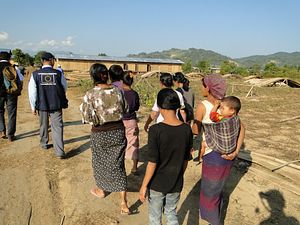China’s Global Times reported on Monday that hundreds of Chinese citizens were trapped in northern Myanmar, the site of a conflict between government troops and the Kachin Independence Army. The Global Times cited a “rebel intelligence officer” as saying that hundreds of Chinese nationals were among 2,000 civilians trapped by a surge in fighting between government forces and rebel soldiers. The officer said that the KIA would provide way for the trapped Chinese citizens to safely return home “if conditions permit.” As it stands, he said, the civilians haven’t been injured, but have little food and water and no medical supplies.
On Tuesday, China’s Foreign Ministry spokesperson Hua Chunying refuted those reports, saying that China’s “preliminary investigation showed that those reports by some media saying that a lot of Chinese people were trapped [in north Myanmar] were untrue.” According to Hua, China’s embassy in Myanmar “sent a joint working group” to the area in question and will continue to investigate the situation. The Chinese embassy in Myanmar also insists that the media reports are not true. The trapped citizens are all locals from Myanmar, an embassy representative told Chinese media.
However, Global Times’ initial report specifically mentions that many of the Chinese citizens who found themselves stranded were in Myanmar without documentation. According to GT, many of them are jade workers; as Reuters points out, Kachin “is known for a flourishing illegal trade in jade.” The other occupations listed by Global Times – miners and loggers – are also often tied to illegal activities within Myanmar. Even as the fighting in Kachin wore on, in fact, a group of Chinese diplomats traveled to the area to investigate reports that over 100 Chinese citizens had been detained for illegal logging operations. There may be good reasons, in other words, for the Chinese embassy not to be aware of these citizens’ presence in Kachin. Meanwhile, an officer from KIA confirmed to the New York Times that between 250 and 300 Chinese citizens were trapped in the area.
Zhu Zhenming, a researcher with the Yunnan Academy of Social Sciences, told Global Times there may not be much the Chinese embassy can do for these citizens. As of now, he explained, the border situation between China and Myanmar is extremely complicated. There’s only one official border crossing (at Ruili), but many Chinese don’t use this to transit the border. Because of harsh penalties that might await those who illegally cross the border, Global Times reports, many of the trapped Chinese citizens are afraid to seek official help. Instead, many are attempting to hide in the mountain forests.
Though the specifics of this incident remain unclear, instability in Kachin overall is an issue of concern for the Chinese government, as Brent Crane pointed out in a recent Diplomat piece. Locals on both sides of the border, Crane reports, “live as if it wasn’t there,” crossing back and forth for work and even school. That means the conflict too often crosses the border – whether in the form of refugees or actual violence. As another Global Times piece points out, fighting in northern Myanmar occasionally spills across the border into Chinese territory, including an incident on Sunday when the government army attacked a rebel position close to Nujiang prefecture in China’s Yunnan province.
China has been fairly hands-off on the Kachin conflict since brokering talks between the government and rebels in 2013. Should violence continue to escalate, threatening Chinese citizens on both sides of the border, that will have to change.
































